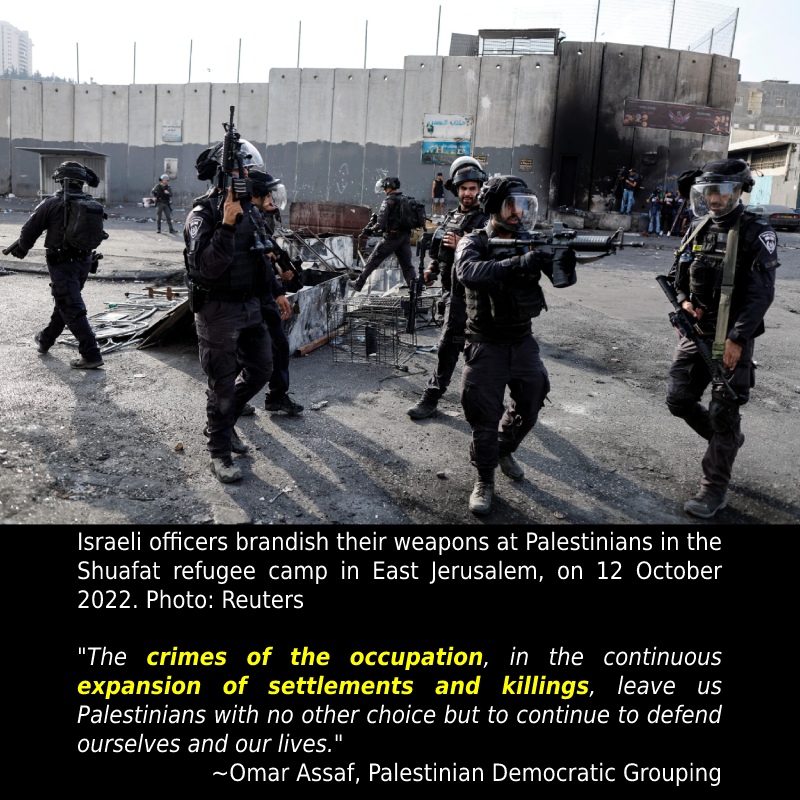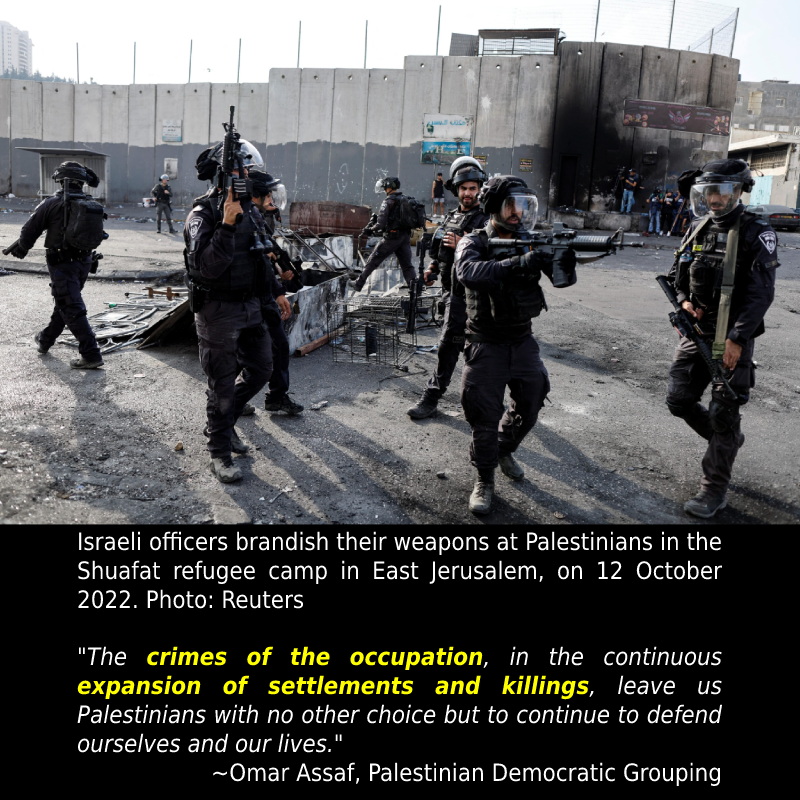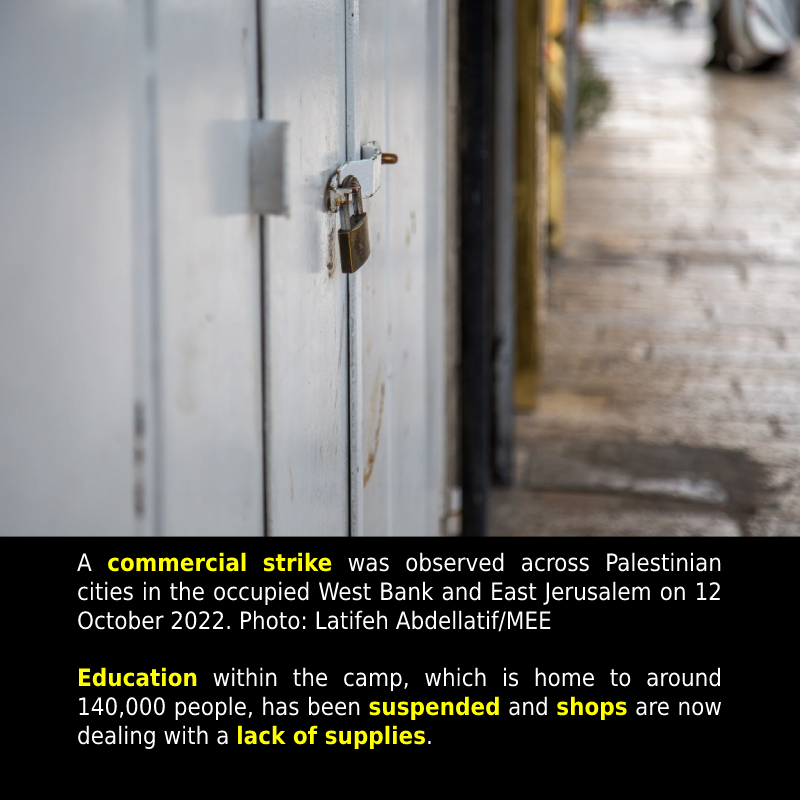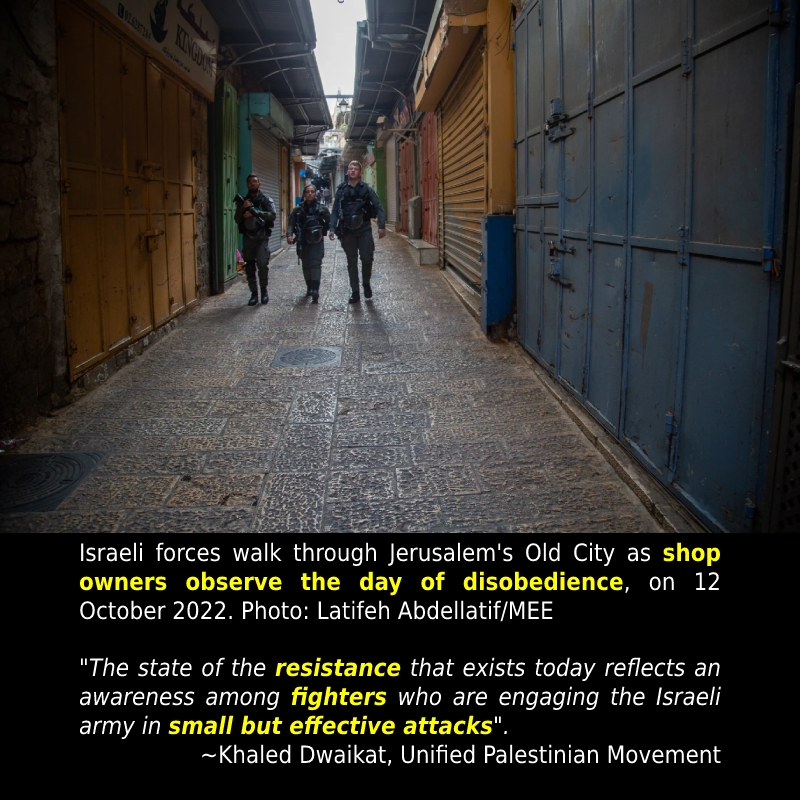By Shatha Hammad in Ramallah, occupied Palestine.

Israeli forces killed a Palestinian on Wednesday as hundreds of people observed a day of civil disobedience in solidarity with a Jerusalem refugee camp that has been under Israeli lockdown for five days.
A general commercial strike was held in occupied East Jerusalem and the West Bank, as hundreds of people joined protests against the recent escalation by Israeli forces.
Osama Adawi, 18, was shot dead in the abdomen by Israeli troops in the al-Aroub camp in Hebron, the Palestinian health ministry said.
أسامة محمود عدوي (18 عاماً) الذي ارتقى برصاص الاحتلال في مخيم العروب شمال الخليل.#فلسطين pic.twitter.com/RllB12S8ES
— شبكة قدس الإخبارية (@qudsn) October 12, 2022
Translation: Osama Mahmoud Adawi (18 years old) who was shot dead by the occupation in Al-Aroub refugee camp, north of Hebron.
The strikes were called for by residents of Shuafat camp in East Jerusalem, who have been trapped in by Israeli authorities since Saturday, and a newly formed armed group in the West Bank named the Lion’s Den.
The announcement by the Nablus-based fighters came after they claimed responsibility for an attack on an Israeli army post near a settlement on Tuesday that left one soldier dead.
The group called for “days of rage” against the Israeli occupation in a statement and urged citizens to join in strikes and protests near Israeli checkpoints.
At the same time, Shuafat residents announced late on Tuesday that they will mark a day of civil obedience to protest against Israeli measures imposed upon them, which have been described as “collective punishment”.
The Wednesday strike, unlike previous ones observed in Palestine, is seen as a significant event by some observers because it was called for by a small armed group and families in Shuafat, rather than organised political or civil groups, who normally lead such initiatives.
Omar Assaf, a member of the Palestinian Democratic Grouping, told Middle East Eye that the positive nationwide response to the civil disobedience call indicates widespread support for armed resistance and an eagerness for new leadership away from the Ramallah-based Palestine Authority.
“The crimes of the occupation, in the continuous expansion of settlements and killings, leave us Palestinians with no other choice but to continue to defend ourselves and our lives,” Assaf said.
“What we are witnessing today in the West Bank confirms the Palestinian people’s willingness to continue working for their cause, but the problem is the absence of a Palestinian leadership capable of capitalising on this.”
Israeli lockdown
Tensions this week escalated on Saturday night.
People in Shuafat camp, located just two kilometres from Jerusalem’s Old City, have been besieged in the neighbourhood since Saturday evening, after an Israeli soldier was fatally shot at a checkpoint leading to the camp.
Shuafat is one of the most overcrowded camps in Palestine. It is home to almost 140,000 refugees – and their descendants – who were displaced from historic Palestine by Zionist paramilitary groups in 1948, to make way for Israel’s creation.
It is the only refugee camp that lies within Jerusalem’s municipal boundaries, but is located on the other side of the Israeli separation wall from the majority of the city. Almost 90 percent of its residents have Jerusalem resident IDs that are different from Israeli or Palestinian Authority citizenship.
Israeli forces identified a suspect in the Saturday shooting as a 22-year-old Palestinian resident of the area, who is believed to be hiding inside the camp.
A strict closure was then imposed on the camp in which no one could go in and out. This has left many Palestinians unable to reach hospitals for critical health treatments.
Education within the camp has also been suspended and shops are now dealing with a lack of basic supplies, including milk and flour.

Additionally, Israeli soldiers have since raided the camp frequently, violently dispersing protests, raiding homes and making several arrests.
The Israeli-run Jerusalem municipality has also failed to send waste collectors to the camp, causing garbage to fill the streets, a Shuafat resident told MEE.
The municipality also said it would close a major bakery belonging to the Tamimi family – from whom Israeli forces believe the suspect hails – even though it serves nearly 30,000 Palestinians, according to one resident.
The closure has been criticised as “collective punishment” by many Palestinian human rights advocates.
Civil disobedience
The camp’s residents gathered late on Tuesday and decided on a number of measures to counter the Israeli restrictions.
They announced a day of civil disobedience and encouraged Palestinians across Jerusalem to join them in protests and strikes. Their statement was read through mosque loudspeakers and printed and distributed around the city.
Suhaib Masalmeh, an activist from Shuafat, said the commitment to the strike call on Wednesday was “remarkable to see. The response has been great by the residents, everyone seems to have complied,” he told Middle East Eye.
Masalmeh said that when residents presented their demands to the army in a piece of paper, a soldier tore it up and told them the closures would only be lifted if the suspected shooter in Saturday’s attack was handed over.

Nonetheless, hundreds of the camp’s residents organised a march early on Wednesday, made up mostly of women and students, which was attacked and dispersed by Israeli forces.
Many young men spread across the camp’s entrances and set up mounds to prevent vehicles from moving around.
Masalmeh added that around 35,000 workers from the camp, who have jobs with Israeli companies in Jerusalem, have also joined the strike, crippling businesses across the city.
Some 600 drivers from Shuafat who work for the Israeli Egged Public Transportation Company did not report for duty on Wednesday, causing disruption to their operations, according to Masalmeh.
West Bank heeds the call
Outside the camp, the civil disobedience call reverberated across Jerusalem and beyond.
Protests and strikes were reported in the neighbourhoods of Issawiya and Beit Hanina, as the Old City looked like a ghost town, with shops shuttered for the day.
In the West Bank, many cities, schools and universities heeded the call, especially after the Lion’s Den group issued a statement calling for an escalation against the Israeli occupation.

In its statement, the group said, “We call for burning tyres, setting up barricades, and closing streets to send a clear message that the people are rallying around the resistance and those persecuted in Jerusalem.”
Nablus, where the armed group is based, had endured Israeli closures late on Tuesday, similar to those imposed on Shuafat.
Checkpoints and roads leading to the city were closed, imposing strict restrictions on movements in and out, hours after an Israeli soldier was killed by fighters who are believed to have fled back to the city.
Khaled Dwaikat, a member of the Unified Palestinian Movement, said the tactics used by armed Palestinians in the West Bank against Israeli targets indicate a new strategy.
“The state of the resistance that exists today reflects an awareness among fighters who are engaging the Israeli army in small but effective attacks,” he told MEE.
“They realise that it’s better for them to avoid large-scale confrontations like in the Second Intifada.”
At least four Israeli soldiers have been killed by Palestinian fighters since May, amid a growing armed resistance in the West Bank.
Meanwhile, more than 160 Palestinians have been killed by Israeli fire this year, including 50 in the Gaza Strip and at least 110 in the West Bank and East Jerusalem. The death toll in the West Bank is the highest recorded in a single year since 2015.
On Wednesday, Israeli troops violently dispersed protests in several areas in the West Bank, including the Dheisheh camp in Bethlehem, the northern entrance of al-Bireh city, al-Aroub camp in Hebron and Sebastia village in Nablus, among others.
Source: Middle East Eye. 13 Oct 2022.